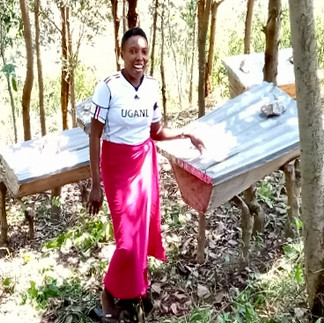Beekeeping Offering a Fresh Start for Marginalised Women
- izzyelton2
- Apr 23, 2025
- 3 min read
Since marking International Women’s Day in March, our spotlight has stayed firmly on hidden gems - the unsung heroes making a difference in their communities and beyond.
This time we’re highlighting the work of Kitabu Integrated Development Association (KIDA), a Ugandan organisation using beekeeping to empower marginalised women. With support from Bees Abroad, they’ve transformed lives, proving that economic independence can be a powerful tool for change.
KIDA was founded in 2011 by four women who recognised the struggles of young
mothers and girls in a culture that undervalues female education. In 2018, they approached Bees Abroad for support in integrating beekeeping into their initiatives.

The partnership with Bees Abroad has enabled KIDA’s beekeeping group to thrive. Their progress is reflected in key milestones:
February 2019 – Assessment Visit
Bees Abroad Chair and volunteer Partnership Manager Richard Ridler, along with fellow volunteer Partnership Manager and master beekeeper Jane Ridler, visited KIDA’s community in the Rwenzori foothills. At the time, KIDA had 40 members, 30 of whom were women. Beekeeping experience was limited, and initial harvests were small. In June 2019, Bees Abroad began a three-year training programme for 30 members.
October 2022 – Update from KIDA

KIDA reported that honey sales were funding a revolving microcredit scheme, helping women start small businesses. With inflation rising, they planned to use honey for value-added products like bar soap. Demand for project inclusion was growing, and KIDA had become the leading honey producer in its sub-county.
"The community is very happy with the project as most of the members have at least 3 beehives and some are demanding to be included in the project which we hope they shall. KIDA is now the leading honey producer in our newly created sub county."
October 2023 – Post-Project Survey
Four years later, a survey by Bees Abroad’s local partner LIDEFO revealed remarkable progress. Honey yields increased from 2.7kg per hive to 15kg, and 28 out of 30 trained beekeepers remained active, including 22 women. Three of the women shared the impact of beekeeping on their lives.
Birra Jozilina [left] joined a women’s savings group, enabling her to cover medical bills and school fees.
Ithungu Stella [middle] used beekeeping income to start a small business.
Birra Jacqueline [right] harvested 45kg of honey, reinvesting profits into her shop.
May 2024 – Expanding to Address Gender-Based Violence
Building on their beekeeping success, KIDA reached out to Richard and Jane with a new project: training 50 women, survivors of domestic violence and floods, in maize and groundnut snack production. They also sought funding to address a neglected form of female genital modification (FGM); labia minora elongation (LME). Bees Abroad gladly provided a reference to support their application.
Economic independence is crucial in reducing gender-based violence, allowing women to support themselves without reliance on marriage or family. KIDA’s journey demonstrates how beekeeping can be a catalyst for broader social and economic transformation.
Bees Abroad’s Commitment to Women’s Empowerment
Bees Abroad prioritises supporting marginalised groups, including women’s organisations. One such group, Biringo Women Beekeepers in Uganda, launched ‘Honey, Sweet Success’ to create sustainable beekeeping businesses. Living on approximately 41p per day, these women aim to build economic independence while contributing to environmental conservation.
Thank you to Bees Abroad for sharing the incredible story of their transformative partnership with KIDA. To support their mission, visit the Bees Abroad website and explore Hive Twinning, or contact info@beesabroad.org.uk for more information.
Got a story you'd like to share with us? We'd love to hear it. Just send us a few details and we'll be in touch.









Comments